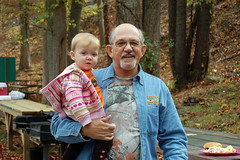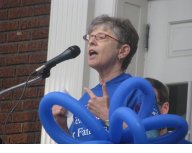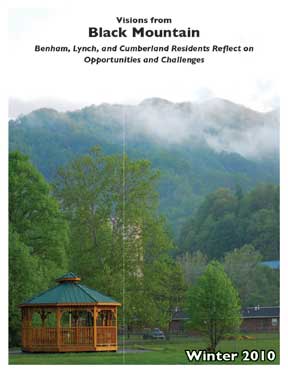Chapter: Harlan County
In Harlan County and eastern Kentucky, we have a rich culture, natural beauty, valuable resources such as mountains, forests and water, and a history worth preserving. We are a chapter of KFTC because we believe that these assets and characteristics define who we are, and in preserving and protecting them we are defending a way of life and leaving what is most special about this place for future generations.
Harlan County residents helped create KFTC, and we are one of its earliest chapters. Our local chapter was built on the dedication and struggles of many who came before us, and since 1981 we’ve continued their efforts. Through the years, we have been involved in successful campaigns to save the upper elevations of Black Mountain (Kentucky’s highest peak) from strip mining and logging, help communities win water lines and a new bridge, and so much more.
Today we are working to build new power in the mountains to protect the water and a way of life threatened by destructive mining methods, while supporting KFTC’s broader efforts to make coal mines safer for miners, fully fund schools and keep college affordable, bring clean energy jobs to this area and expand voting rights.
Recent Activities
Great resources and videos from Appalachia's Bright Future conference now online
Reflection on Appalachia's Bright Future conference
Appeals Court agrees: permit used to bury streams with mining wastes not valid
Appalachia's Bright Future opening session sets tone of challenge and hopefulness
Carl Shoupe on Appalachia's Bright Future
Page
Chapter Feature:
 "Many of us are working to create a better future for our children and grandchildren - and we've got lots of possibilities and real ideas about how to do that. We've got a bright future if we want it."
"Many of us are working to create a better future for our children and grandchildren - and we've got lots of possibilities and real ideas about how to do that. We've got a bright future if we want it."
- Carl Shoupe, Benham, KY
Residents of Benham, Lynch and Cumberland share their visions for the unique Tri-Cities area.
Regular Meetings:
We meet every other even month on the second Thursday at 6 p.m. We move our meeting locations around the county. Check the calendar!
Other Pages
- Benham and Lynch
- Benham residents building community energy
- Building a Clean Energy Future in Benham and Lynch
- Clean Water Act case against ICG and Frasure Creek Mining
- Elmer Lloyd's Pond
- Kentucky Poor People's Campaign
- Protecting Benham and Lynch
- The cost of being number one in mountaintop removal
- Toxic selenium in Kentucky streams
- Home
- |
- Sitemap
- |
- Get Involved
- |
- Privacy Policy
- |
- Press
- |
- About
- |
- Bill Tracker
- |
- Contact
- |
- Links
- |
- RSS






